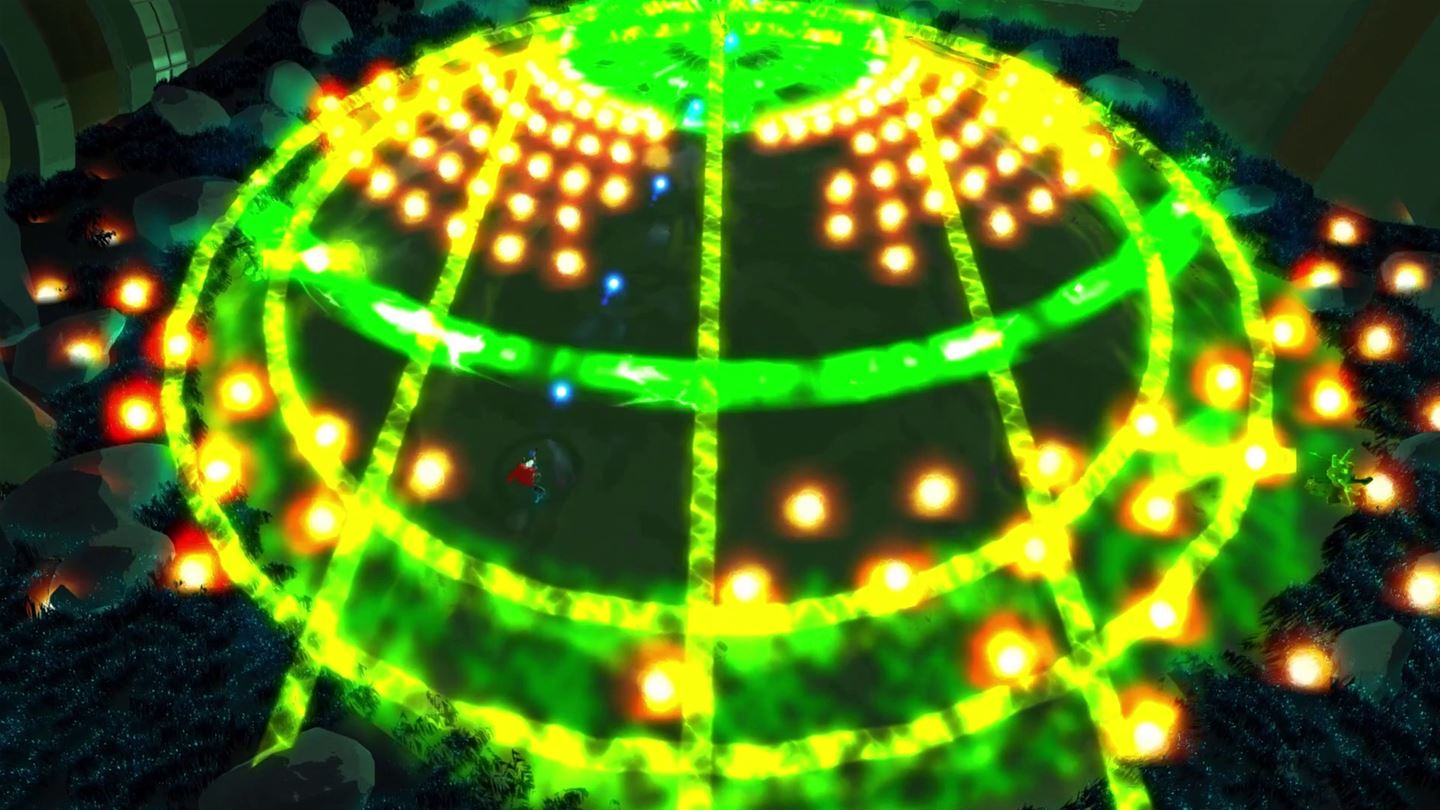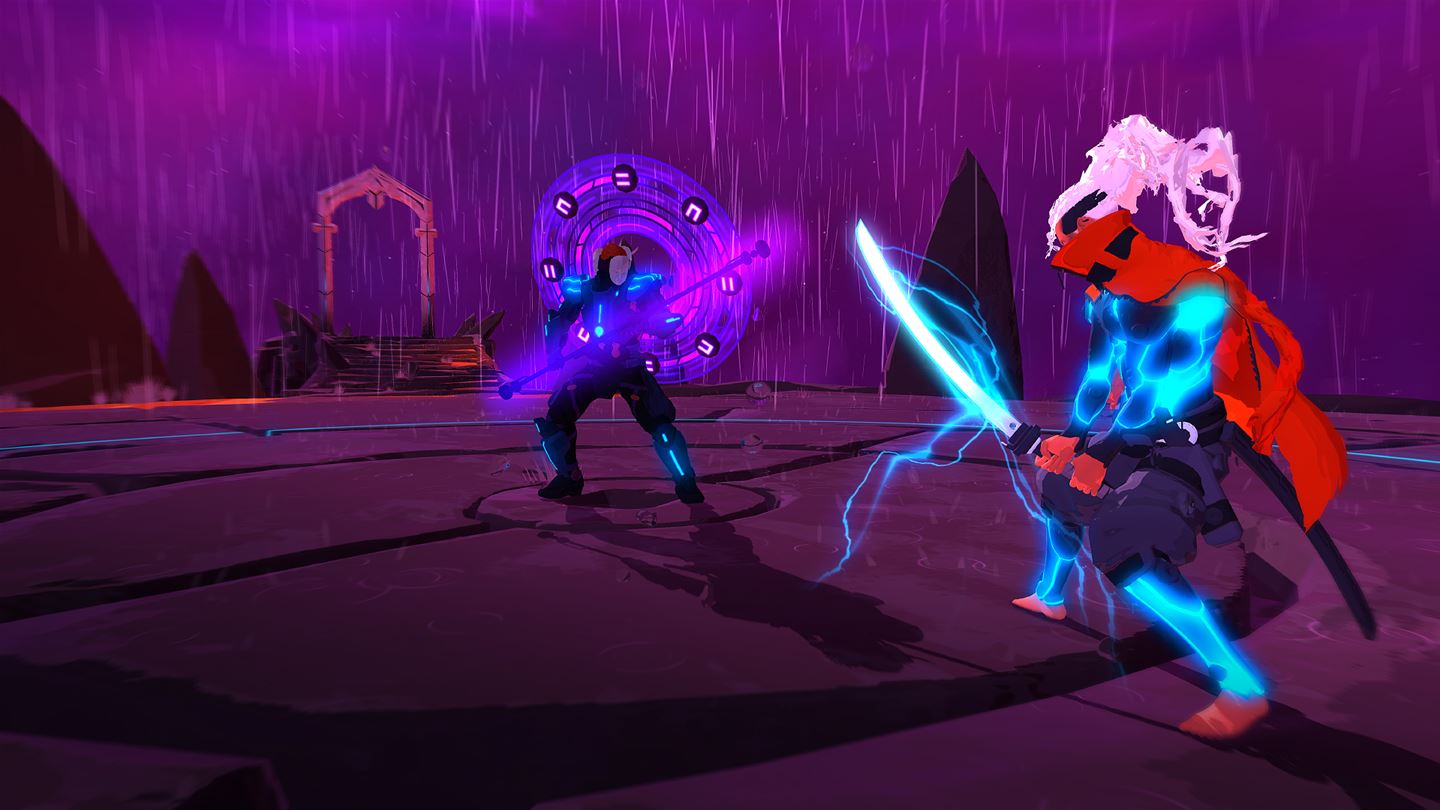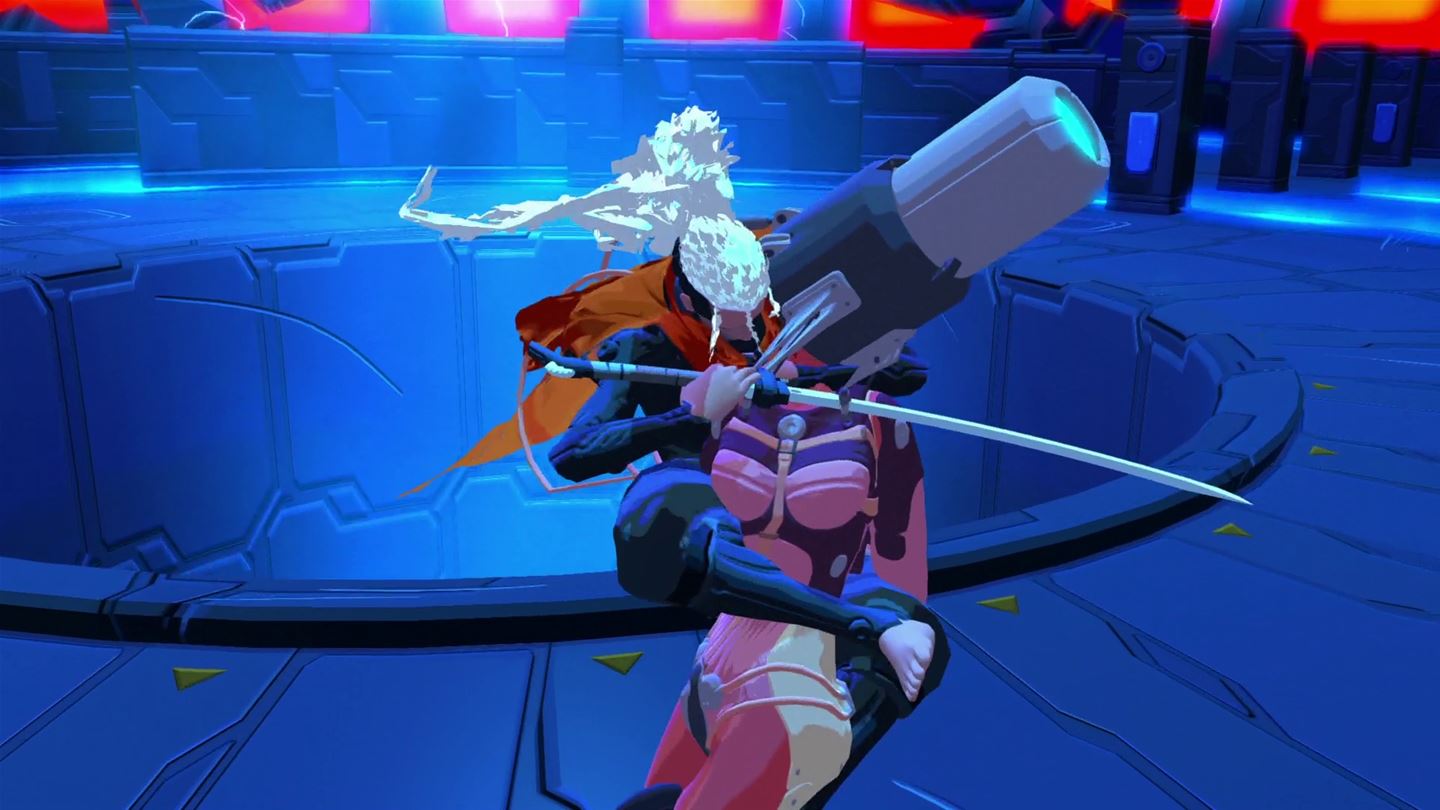
Why do we go to the gym? Well, to become stronger of course. Maybe faster, maybe slimmer, but, in any case, to become a stronger version of ourselves. But going to the gym is not an instantaneous cure: simply walking through the glass doors does not augment your body to your ideal situation (yet). No, there is work to be done, energy to be spent, sweat to be dripped and hours to be invested towards your goal. You cannot and will not see the results you want in a single day: it will take many. Perhaps there are days where you look in the mirror and feel yourself moving towards that goal post, and, on others, there are days where you feel like you haven’t moved at all. Yet every second that you put towards the new you is a step in the right direction, with some being harder than others. You must try hard. Some days, you will fall. Some you may even want to quit. But quitting is to stop, and you – if you truly want strength – cannot stop.
Furi is the tale of The Stranger, a nameless entity who is immortal and being held prisoner in a very interesting and very complex jail. Several layers above the world, the Stranger is killed daily, only to come back to life, and his jailer is very, very happy with his job. One day, the Stranger finds a friend, which is very unusual when you’re kept in a Prometheus-state of torture for all time. The friend finds a way to free the Stranger, and his jailer is a both angry and elated that the Stranger is free. Now, the jailer has a chance to really hurt the Stranger. But the Stranger is not unarmed: he has his sword, and he has his gun. He is fast like lightning, and he strikes like a cobra. And the Stranger is, still, immortal: though he can be hurt, he cannot die. So the Stranger will try again, and again, to get past his jailer. When he does, he learns the full gravity of it all: several guardians have come together, each in their own unique lair, united in the single mission to keep the Stranger from going back to the planet. But the Stranger’s friend is quite encouraging, and the Stranger is tired of dying in pain. And so the journey down begins.

Have you ever just basked in a boss fight, a really good boss fight, and wondered why you wasted your time with the little guys beforehand? Furi is nothing but boss fights, and that’s not an exaggeration. The time and space inbetween the fights merely serves as exposition: you get a chance to hear The Stranger’s friend ramble on and on about why the Stranger is here, and who the guardians are. You don’t even need to walk on your own volition: for most of the game, hitting a single button will make your character auto walk from point A to point B, which can actually be quite helpful at times: with the amazingly bizarre mix of worlds, there are times when your perspective and orientation will change suddenly, and the act of walking becomes a bit of a chore and frustrating. Not to worry: walking is paltry compared to what you need to do, which is to win.
Each boss in Furi has their own unique patterns of attack and defense, but there are a few key, core elements that echo throughout. Firstly, no boss will go down easily: many have multiple lifebars, and the depletion of each lifebar leads to a new style of attack that your character now needs to deal with. The first stage is the easiest, and it gets progressively harder until you reach the climactic battle, which is often quite difficult. Your character can die up to three times per encounter: if you die, that phase of the battle resets, and the guardian heals themselves. Additionally, if you knock a guardian down a full life bar, your health will also replenish. If the guardian knocks you down three times, the fight is over, and you must start over again from the beginning. It’s more than fair, and it’s also important to helping you learn the most important lesson Furi has to offer: patience.
The combat of Furi is, to say the very least, an amazingly beautiful ballet of destruction and articulate mayhem. There’s a ranged attack that does small amounts of damage but can wear an opponent down over time. Your blade, the primary weapon, has both a fast, small attack, and a charged, heavy attack. Landing a heavy attack takes timing and practice, but can be incredibly effective in taking large chunks out of your opponent. There’s also a dashing dodge, which can be the only way to avoid massive, room-consuming waves of energy and damage that the guardian may throw out. But, most importantly, there’s a parry block, and mastering the parry block is the key to winning many fights. Several effective parrys can recover health and activate a devastating combo attack that may take as much as 20% off a guardian’s health bar. The problem, as you may have guessed, is that no two guardians are the same, and even no two attack phases are the same. What may have worked several seconds ago will only get you killed slower in the current state. Instead, you need to rise and adapt. Become a better version of yourself in each guardian, learning what they will and will not throw at you. Guardians who rely on range, on camouflage, on time manipulation and massive weapons. Guardians who know what the Stranger is, and those who fear what he can do. Every single boss is in this fight for their lives, and, as scary as that is, it’s exhilarating: leave it all on the dance floor.

If Furi presents itself too difficult, which is understandable, there is Promenade mode, where the bosses are significantly easier. This might actually be a good idea if you’ve never played Furi before, because the Nintendo Switch is a hard place to begin the quest from. The Game Bakers have done a marvellous job of making this visual feast run well on the Switch, but damn does the console get hot when you’re playing in portable mode. However, they have done it, and the audio and visual differences are indistinguishable. They’ve said in a blog release that the bosses are easier on the Switch than on the PC release, but I have a hard time believing that in light of my constant and irreparable deaths. Additionally, all the DLC from the Steam version is included, meaning the extra bosses become available once you beat the game on standard Furi difficulty. And if you wanna take a run at Furier in the speedrun mode, be my guest: this is a game of excellence and skill building, in my eyes, and I cannot imagine doing it in any amount of speed.
What makes Furi stand apart isn’t just the concept: it’s the presentation. The colors and saturation of the world of the Stranger are dark and gorgeous, like a gothic cyberpunk reality that bleeds despair and mystery. The constant narration by your “friend” is incredibly memorable, and just the opening line’s tiny sting of “pitter, patter” flutters in my stomach like the awakening of something terrible. You know there’s a reason the Stranger must have been exiled and why such effort was put in to lock him away, and yet you make him walk, one foot after another, towards the future and whatever terrible destiny may yet come. It’s a waking nightmare of abstract thoughts and desires, and I loved every minute of it. If you have even a small inkling to find out what strength you may carry, then pick up Furi: you’d be surprised how far you can go without knowing where you’re headed.

REVIEW CODE: A complimentary Nintendo Switch code was provided to Bonus Stage for this review. Please send all review code enquiries to press@4gn.co.uk.
Subscribe to our mailing list
Get the latest game reviews, news, features, and more straight to your inbox
Thank you for subscribing to Bonus Stage.
Something went wrong.
-
Gameplay - /10
0/10
-
Graphics - /10
0/10
-
Sound - /10
0/10
-
Replay Value - /10
0/10





